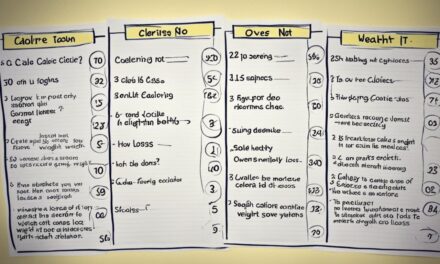Have you ever found yourself standing in front of the fridge, late at night, desperately searching for something to satisfy your cravings? We’ve all been there. It’s as if those cravings have a mind of their own, pulling you away from your weight loss goals and tempting you with every delicious bite.
But what if I told you there’s a secret “hunger hormone hack” that can help you take control of your appetite and stop cravings in their tracks? It’s true! By understanding the science behind hunger hormones and adopting some simple strategies, you can finally regain control over your eating habits and achieve your weight loss goals.
Imagine this: You’re sitting at a café, sipping on your favorite latte, when suddenly a fresh batch of chocolate chip cookies emerges from the oven. The warm, irresistible smell wafts through the air, and your senses are instantly captivated. Your stomach rumbles, and your mouth starts to water. It’s a familiar feeling, a craving that’s hard to resist.
But instead of reaching for the cookie jar, you remember the hunger hormone hack you’ve recently learned. You know that protein-rich foods can increase satiety and help control your appetite. So you order a plate of eggs and turkey bacon, knowing that the protein will keep you satisfied and prevent those cravings from taking over.
As you enjoy your protein-packed meal, you can feel the hunger hormone hack in action. The cravings that once seemed so strong start to diminish, and you’re left feeling satisfied and in control. It’s a small victory, but it’s a step in the right direction towards achieving your weight loss goals.
Key Takeaways:
- Incorporating protein-rich foods into your meals can help increase satiety and control cravings.
- Adding fiber to your diet can slow gastric emptying and promote feelings of fullness.
- Prioritizing adequate sleep is important for appetite regulation and hunger control.
- Managing stress can help reduce emotional eating and cravings.
- Understanding the difference between psychological and physical hunger can guide effective strategies for appetite control.
The Power of Protein in Hunger Management
When it comes to managing hunger and controlling cravings, protein is a powerful ally. Not only does it satisfy your appetite, but it also plays a crucial role in regulating your hunger hormones. By incorporating protein-rich foods into your meals, you can effectively control your appetite and avoid overeating.
Proteins are known to induce satiety, making you feel full and satisfied after a meal. They also increase the secretion of gastrointestinal hormones that help regulate your appetite. This means that by consuming protein, you can curb your cravings and reduce the urge to snack on unhealthy foods.
Research has shown that high-protein snacks can improve appetite control, increase satiety, and reduce subsequent food intake. Whether it’s a delicious chicken breast, a hearty bean salad, or a scoop of protein powder in your smoothie, incorporating protein into your meals can make a significant difference in managing your hunger.
Not only does protein help control your appetite, but it can also contribute to weight loss. Higher protein diets have been shown to lead to improvements in body weight management, reduction in energy intake, and beneficial changes in body composition. By consuming the recommended minimum amount of protein, which is around 30g per eating occasion, you can experience these positive effects on weight management.
Protein Sources for Hunger Management
Protein can be derived from both animal and plant sources. Both options have shown similar appetite suppressing effects, so you have a range of delicious choices to suit your dietary preferences. Some protein-rich foods include:
- Lean meats like chicken, turkey, and fish
- Eggs
- Dairy products like Greek yogurt and cottage cheese
- Legumes such as beans, lentils, and chickpeas
- Tofu, tempeh, and other soy products
- Quinoa and other whole grains
- Nuts and seeds
By including these protein sources in your meals and snacks, you can harness the power of protein to effectively manage your hunger, control your cravings, and support your weight loss goals.
Summary
“Protein is a hunger hormone hack that can help you regain control over your appetite. By incorporating protein-rich foods into your meals, you can induce satiety, reduce cravings, and support your weight loss journey.”
Remember, don’t underestimate the power of protein in hunger management. By making protein a staple in your diet, you can take a significant step towards controlling your appetite, satisfying your cravings, and achieving your weight loss goals.
The Role of Fiber in Appetite Control
Adequate fiber intake plays a vital role in managing hunger and controlling your appetite. Foods that are high in fiber have several benefits when it comes to curbing cravings and regulating your appetite. Let’s take a closer look at how fiber can help you in your quest to manage your hunger hormone.
1. Slowing Gastric Emptying: Fiber-rich foods slow down the process of gastric emptying, which means that it takes longer for your stomach to empty its contents. This delay in digestion can increase feelings of fullness and reduce the frequency and intensity of cravings.
2. Increasing Satiety: Including fiber in your meals helps promote satiety, which is the feeling of fullness and satisfaction after eating. Fiber adds bulk to your meals, making you feel fuller for longer periods. This can prevent overeating and unnecessary snacking between meals.
3. Promoting Appetite Regulation: High-fiber foods help regulate your appetite by interacting with your body’s digestive system. When fiber is consumed, it ferments in the gut and produces short-chain fatty acids. These fatty acids stimulate the production of hormones that promote feelings of fullness and aid in appetite regulation.
4. Enhancing Weight Management: Adding fiber to low-calorie and low-fat foods can enhance their satiety factor. By increasing the volume of the food without adding extra calories, fiber can help you feel more satisfied with your meals, ultimately supporting your weight management goals.
“Fiber is like a superhero that swoops in to save the day by reducing cravings and helping you stay satisfied. It’s a natural hunger hormone hack that can be easily incorporated into your meals.”
By combining fiber-rich foods with other hunger hormone hacks, such as increasing protein intake, you can create powerful and satisfying meals that will keep cravings at bay and provide long-lasting satiety. So, make sure to include plenty of fruits, vegetables, whole grains, legumes, and nuts in your diet to reap the appetite-controlling benefits of fiber.
The Impact of Sleep on Hunger and Cravings
When it comes to hunger and cravings, a good night’s sleep might be the secret weapon in your arsenal. Sleep plays a crucial role in regulating appetite, energy use, and weight control. Lack of sleep can throw a wrench in the delicate balance of hunger hormone regulation, leading to increased appetite and decreased feelings of fullness. It’s like a conspiracy against your weight loss goals!
Think of it this way: sleep deprivation messes with your hormones in a way that favors cravings and overeating. The hunger hormone, ghrelin, gets a boost, making you ravenous for all the wrong foods. On the other hand, the hormone leptin, responsible for suppressing appetite, takes a hit and becomes less effective. It’s like a double whammy on your willpower.
But it doesn’t stop there. Disruptions in these hunger hormones not only lead to increased cravings but can also impact blood sugar and insulin levels, which can contribute to weight gain and obesity. It’s a vicious cycle that can be difficult to break.
“Sleep is the golden chain that ties health and our bodies together.” – Thomas Dekker
Research has shown that people who skimp on sleep are more likely to be overweight or obese and have a preference for calorie-dense and carbohydrate-rich foods. It’s like your body is searching for an energy boost to compensate for its sleep-deprived state. So that late-night cookie craving? Blame it on the Zs you’re missing.
But fear not, dear reader. There is hope.
Prioritizing adequate sleep can be a powerful hunger hormone hack to control cravings and manage your appetite. By getting enough restful sleep each night, you give your body the chance to reset those hunger hormones and restore balance.
“Sleep is that golden chain that ties health and our bodies together.” – Thomas Dekker
Try incorporating these sleep tips into your routine:
- Stick to a consistent sleep schedule
- Create a cozy sleep environment
- Avoid caffeine and electronics before bed
- Establish a relaxing bedtime routine
And remember, it’s not just about quantity – quality sleep matters too. If you’re having trouble getting a good night’s sleep, consider consulting with a healthcare professional for further guidance.
Take Control of Your Sleep, Take Control of Your Cravings
Getting enough quality sleep is an essential ingredient in the recipe for appetite control and weight management. By prioritizing your sleep, you can prevent those late-night snack attacks and regain control over your cravings.
So, snuggle up, sleep tight, and wake up ready to conquer those cravings and stay on track with your health goals!
| Benefits of Adequate Sleep for Hunger and Cravings Management | Ways to Improve Sleep Quality |
|---|---|
| Regulates appetite and hunger hormones | Stick to a consistent sleep schedule |
| Reduces cravings and overeating | Create a cozy sleep environment |
| Prevents weight gain and obesity | Avoid caffeine and electronics before bed |
| Promotes balance in blood sugar and insulin levels | Establish a relaxing bedtime routine |
Managing Cravings Through Stress Management
Stress can wreak havoc on your cravings and lead to uncontrollable emotional eating. When stress levels rise, so does the drive to eat, often resulting in binge eating and the consumption of non-nutritious comfort foods. The release of cortisol, the stress hormone, plays a significant role in stress-induced eating behavior and weight gain. To effectively manage your cravings and appetite, it’s crucial to find ways to combat stress.
Implementing stress management techniques can be a powerful hunger hormone hack to regain control over your cravings. Exercise, mindfulness, and relaxation techniques are among the effective strategies you can use to reduce stress-induced cravings and emotional eating. By incorporating these stress management strategies into your daily routine, you can better manage your appetite and take charge of your cravings.
Stress-Busting Techniques
Here are some stress-busting techniques you can try:
- Exercise: Engaging in regular physical activity helps release endorphins, your body’s natural stress relievers. Whether it’s a yoga class, a jog in the park, or dancing to your favorite tunes, find an exercise that brings you joy and helps you alleviate stress.
- Mindfulness: Practice mindfulness meditation or deep breathing exercises to center your thoughts and calm your mind. Taking a few moments each day to be present and focus on your breath can help reduce stress levels and prevent emotional eating.
- Relaxation Techniques: Explore relaxation techniques such as progressive muscle relaxation, guided imagery, or aromatherapy to create a tranquil and peaceful environment. These techniques can help you unwind and reduce stress, allowing you to make conscious choices about your food intake.
“Stress is not what happens to us. It’s our response to what happens. And response is something we can choose.” – Maureen Killoran
The Benefits of Stress Management
By actively managing stress, you can reap a multitude of benefits in addition to curbing cravings and managing your appetite:
- Improved Mental Well-being: Stress reduction techniques can enhance your overall mental well-being by reducing anxiety, improving mood, and promoting greater emotional stability.
- Enhanced Sleep: Better stress management can lead to improved sleep quality, which is vital for appetite regulation and weight management.
- Increased Productivity: When stress levels are lower, you’re better equipped to focus, concentrate, and perform at your best. By managing stress, you can enhance your productivity and achieve your goals more effectively.
Understanding the Different Types of Hunger
When it comes to managing cravings and controlling your appetite, it’s essential to understand the different types of hunger. We can categorize hunger into two distinct forms: psychological hunger and physical hunger.
Physical Hunger: This type of hunger is your body’s way of signaling that it needs fuel. It is accompanied by physical symptoms such as low energy, stomach rumbling, or low blood sugar. Your body is sending clear signals that it’s time to refuel and meet its nutritional needs.
Psychological Hunger: On the other hand, psychological hunger is not based on a physical need for nourishment. Instead, it is driven by emotional associations, habits, or the release of dopamine in the brain. Psychological hunger can be triggered by chaotic environments, emotional states, or associations with certain foods.
By recognizing the difference between these two types of hunger, you can develop effective strategies to manage your appetite and control cravings. Let’s delve deeper into each type.
The Temptations of Psychological Hunger
“I can’t resist that slice of cake, it’s calling my name!”
Pssst! Did you know that psychological hunger often lures you into a world of temptations and cravings? This type of hunger doesn’t come from your body’s physical needs but rather from your emotions and dopamine-driven desires.
Imagine sitting at your chaotic work desk, feeling stressed and overwhelmed. Suddenly, you crave a bag of chips or a sugary treat to help you cope. This type of hunger relies on emotional associations and habits that prompt you to seek comfort or distraction through food.
Psychological hunger can also be triggered by the dopamine release in your brain, which occurs when you indulge in certain pleasurable foods. The sensation of pleasure becomes intertwined with cravings, leading you to desire these foods even when you’re not physically hungry.
To overcome psychological hunger, recognizing your emotional triggers and finding healthier ways to cope with stress and emotions is key. Practice mindfulness techniques, engage in regular exercise, or seek support from loved ones. By addressing the underlying emotional associations and habits, you can break free from the temptations of psychological hunger and regain control over your appetite.
Tackling Physical Hunger for Satiety
“My stomach is grumbling, time to fill it up with some nourishment!”
Your body’s physical hunger is an essential and natural signal that it needs sustenance. Unlike psychological hunger, physical hunger arises from your body’s requirement for fuel and proper nutrition. It’s your body’s way of saying, “Hey, I need nourishment to function optimally!”
Physical hunger comes with unmistakable signs like low energy, stomach rumbling, or a feeling of lightheadedness. These signals indicate that it’s time to prioritize refueling your body with nourishing foods to satisfy its nutritional needs.
When responding to physical hunger, it’s important to choose wholesome, nutrient-dense foods that provide satiety and promote overall well-being. By fueling your body with the right balance of carbohydrates, proteins, fats, and essential nutrients, you can address physical hunger effectively and maintain a healthy relationship with food.
Cravings Unmasked: The Battle Between Hunger Types
“Pizza or salad? My stomach is growling, but my mind is screaming for that cheesy goodness!”
The eternal struggle between psychological hunger and physical hunger becomes most apparent when cravings arise. Cravings are often a result of psychological hunger, driven by emotional associations, habits, or the release of dopamine in the brain. These irresistible urges can make it challenging to choose nutrient-dense foods over indulgent treats.
The battle between hunger types can be fierce, with your mind and body seemingly at odds. Your stomach may growl, signaling physical hunger, while your mind fixates on a particular food that brings pleasure and comfort. It’s essential to recognize these cravings for what they are – a product of psychological hunger – and find ways to address the underlying emotional triggers without giving in to unhealthy temptations.
By staying mindful of your hunger cues, understanding the drivers of psychological hunger, and nourishing your body with wholesome foods to fulfill physical hunger, you can navigate the battle of cravings and make choices that align with your goals for health and well-being.
- Physical Hunger: Driven by physiological needs, accompanied by physical symptoms such as low energy, stomach rumbling, or low blood sugar.
- Psychological Hunger: Stemming from emotional associations, habits, or dopamine release, triggered by chaotic environments, emotional states, or associations with certain foods.
- Cravings: Arise from psychological hunger, characterized by irresistible urges for specific foods driven by emotional associations or the release of dopamine in the brain.
Understanding the different types of hunger is an essential step towards developing effective strategies for appetite control and cravings management. By being mindful of your emotional triggers, addressing stress and emotional associations in healthier ways, and fueling your body with wholesome foods, you can regain control over your appetite and make choices that support your overall well-being.
Conclusion
So, you’ve learned about the hunger hormone hack to conquer your cravings and regain control over your appetite. Managing hunger and cravings is crucial for successful weight loss and appetite control, and incorporating these strategies into your lifestyle can make a significant difference.
First, let’s talk about the power of protein. By increasing your protein intake, you can induce satiety and regulate your appetite. Whether you choose animal or plant sources, incorporating protein-rich foods into your meals can help you stay full and reduce those pesky cravings.
Next, don’t underestimate the role of fiber. By adding fiber to your diet, you can slow down gastric emptying and promote feelings of fullness. This will help you stay satisfied for longer periods and avoid unnecessary snacking.
Getting enough sleep is also essential. Sleep deprivation can disrupt the hunger-regulating hormones in your body, leading to increased cravings and a decrease in satiety. Prioritizing quality sleep will not only help you manage your appetite but also contribute to overall weight loss success.
Lastly, don’t forget to manage stress. Stress can trigger emotional eating and cravings for unhealthy foods. By finding effective stress management techniques, like exercise or mindfulness, you can reduce stress-induced cravings and gain better control over your appetite.
By implementing these hunger hormone hacks and making them part of your daily routine, you can stop those cravings in their tracks and achieve your weight loss goals. Remember, it’s not about depriving yourself; it’s about finding the right balance and nourishing your body in a way that supports your overall well-being.
FAQ
How can I suppress hunger and control cravings?
How does protein help in appetite control?
What is the role of fiber in appetite control?
How does sleep affect hunger and cravings?
How can stress management help in controlling cravings?
What are the different types of hunger?
MORE SOURCES TO READ:
- https://www.linkedin.com/pulse/hunger-hacks-how-manage-your-cravings-luke-hirst
- https://werstupid.com/blog/4-ways-to-suppress-hunger/
- https://thebettyrocker.com/7-hacks-to-crush-your-food-cravings/
![]()














Recent Comments